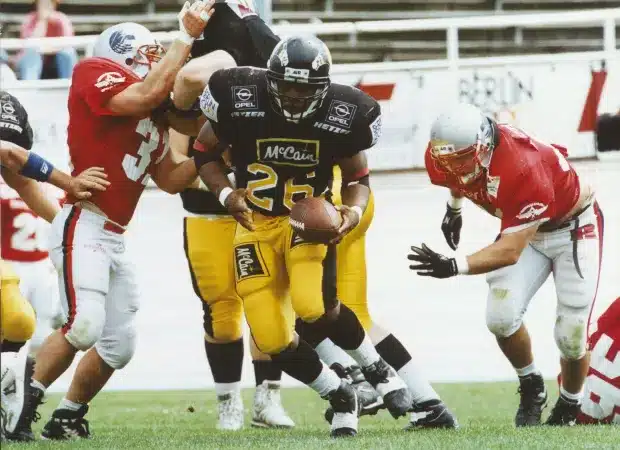BERLIN, Germany — The NFL is back in Berlin for the first time in more than three decades, as the Indianapolis Colts and Atlanta Falcons take center stage Sunday at the Olympiastadion, marking a historic milestone in the league’s continued international expansion.
For the NFL, this game isn’t just another stop on its global tour — it’s a symbolic return to one of Europe’s most iconic sporting venues. The Berlin showdown will be the first regular-season NFL game ever played in the German capital, and the first time the league has visited the city since hosting a series of preseason exhibition games between 1990 and 1994.
The matchup between the Colts (5–4) and Falcons (4–5) represents another key step in the league’s bid to cement American football’s place in European sports culture.
Historic Venue Steeped in Sporting Legend
The Olympiastadion has long stood as a cathedral of global sporting history. Originally built for the 1936 Summer Olympics, the stadium became famous — and infamous — for hosting the Games under Adolf Hitler’s regime. Yet it was during those same Games that African-American sprinter Jesse Owens made history, winning four gold medals (100m, 200m, 4x100m relay, and long jump) and defying Nazi ideology in front of the world.
That moment still echoes within the walls of the stadium, now home to Hertha Berlin since the Bundesliga’s founding in 1963.
The Olympiastadion later played host to matches during the 1974 FIFA World Cup, and after Germany’s reunification, it welcomed the NFL’s earliest ventures into Europe. Between 1990 and 1994, Berlin hosted four NFL exhibition games — matchups that featured franchises like the San Francisco 49ers, Miami Dolphins, and New Orleans Saints, as the league tested its international reach.
Following a major renovation completed in 2004, the venue now seats 74,475 fans, making it Germany’s largest stadium. It went on to host some of the most unforgettable sporting moments of the 21st century.
Moments That Defined the Olympiastadion
Perhaps no memory is as iconic — or controversial — as Zinedine Zidane’s infamous headbutt in the 2006 FIFA World Cup Final between France and Italy. In extra time, the French captain was sent off after driving his head into Marco Materazzi’s chest — an act of emotion that stunned the world.
As Zidane walked past the glittering World Cup trophy toward the tunnel, cameras captured an image that has since become one of sport’s most haunting — a fallen hero in his final moment as a player.
Italy went on to win the final in a penalty shootout, but Zidane’s act, raw and unforgettable, remains etched into the fabric of the Olympiastadion’s lore.
Just three years later, another legend etched his name into Berlin’s sporting annals. On August 16, 2009, Jamaican sprinter Usain Bolt obliterated his own world record in the 100 meters, stopping the clock at 9.58 seconds during the World Athletics Championships.
That performance, often described as the pinnacle of human speed, remains the fastest 100m ever recorded, a record that has stood unchallenged for over 15 years. In recognition of his achievement, Bolt was gifted a three-ton piece of the Berlin Wall, which was shipped to his training camp in Jamaica — a symbolic reminder of how sport unites and transcends history.
Football’s Next Chapter in Berlin
Now, nearly 95 years after Owens’ triumph and 16 years after Bolt’s brilliance, the Olympiastadion prepares for a new chapter — American football under the NFL banner.
The game represents another step forward in the league’s International Series, which has expanded from London to Mexico City, Munich, and Frankfurt. The Berlin game continues the NFL’s momentum in Germany, where fan enthusiasm has surged since the country hosted its first official regular-season game in 2022.
NFL Commissioner Roger Goodell has made no secret of the league’s ambitions to establish a permanent foothold in Europe. With strong television ratings, rapid merchandise sales, and an estimated 3 million fans in Germany, Berlin provides an ideal backdrop for the NFL’s next leap forward.
“This is a return to one of sport’s most historic venues,” Goodell said earlier this week. “Berlin has seen legends across generations — from Jesse Owens to Usain Bolt. Now, the NFL is honored to add to that story.”
Colts vs. Falcons: What’s at Stake
On the field, Sunday’s clash carries playoff implications for both teams. The Colts, led by quarterback Anthony Richardson, look to continue their momentum after a statement win last week. Meanwhile, the Falcons, behind a surging Bijan Robinson, hope to keep their NFC South hopes alive.
But for fans in Berlin, the result may matter less than the spectacle itself — a celebration of sport’s global reach and the merging of athletic cultures on one of the most storied stages in the world.
From Owens’ gold medals to Bolt’s world record, and now the NFL’s historic return, the Olympiastadion continues to remind us that greatness has many forms — and on Sunday, it’ll be wearing pads and helmets.




